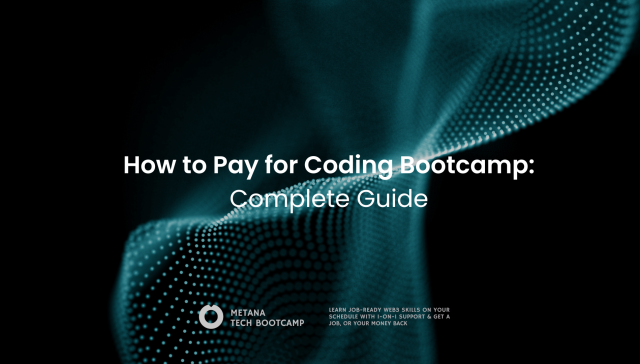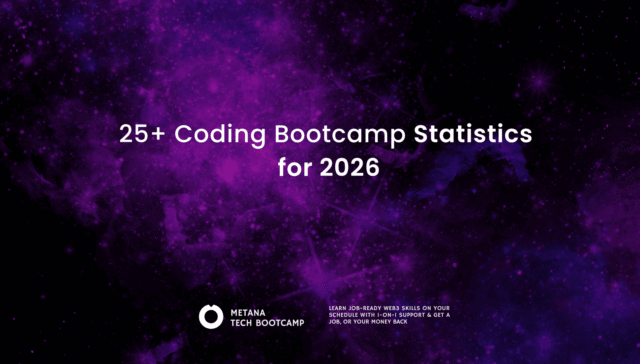TL; DR
Data science bootcamps offer a rapid path to high-demand careers. Key reasons to consider them in 2025 include the following.
- Programs last 12 to 24 weeks and teach skills like Python, SQL, and machine learning.
- They provide a faster, cheaper alternative to traditional degrees for entering data roles.
- Top programs place 70 to 90 percent of dedicated students in jobs within six months.
- Graduates often secure roles like data analyst or junior data scientist, earning $75,000 to $100,000.
- Success depends on program quality, student commitment, and career support utilization.
Is a Data Science Bootcamp Worth the Investment?
Yes, absolutely. In 2025, a data science bootcamp is worth the investment if you choose a reputable program with job placement rates of 70 to 90 percent within six months, experienced instructors, and a curriculum covering Python, SQL, machine learning, and cloud tools.
Compared to expensive, time-intensive degrees, bootcamps offer a quicker, more affordable path for career changers or self-learners needing structure, but full commitment is essential.
What Is a Data Science Bootcamp?
A data science bootcamp is a fast-paced training program preparing individuals for roles such as data analyst, data scientist, or machine learning engineer. Spanning 12 to 24 weeks, these programs are offered in full-time, part-time, or online formats. Unlike degrees, bootcamps emphasize industry-relevant skills through projects and portfolio development. The curriculum blends technical and complementary skills for job readiness.
Core Technical Skills
The technical curriculum covers a range of essential tools and techniques, including the following.
- Python, utilizing libraries such as Pandas for data manipulation, NumPy for numerical tasks, and SciPy for statistical analysis.
- SQL, designed for querying and managing databases efficiently.
- Machine learning, focusing on building models like regression, classification, and neural networks.
- Data visualization, emphasizing the creation of visuals using tools like Matplotlib, Seaborn, Plotly, or Tableau.
- Frameworks such as Scikit-learn, TensorFlow, or PyTorch, introduced for model development.
- APIs and web scraping, taught with tools like BeautifulSoup or Scrapy for data extraction.
- Cloud platforms, including AWS, GCP, or Azure, explored for scalable data processing.
Complementary Skills
Beyond technical skills, bootcamps teach version control with Git and GitHub for collaboration. Data storytelling helps students communicate insights to stakeholders. Capstone projects involve solving real-world problems to create portfolio-worthy work. Agile methodologies prepare students for team-based workflows and project sprints.
Bootcamps prioritize job readiness, making them ideal for career transitions. For a sample curriculum, explore programs offered by providers like Metana.
Why Data Science Bootcamps Are Popular in 2025
Demand for data professionals is surging. The U.S. Bureau of Labor Statistics projects a 35 percent growth in data scientist jobs through 2032, surpassing the 8 percent average for all occupations. Global data creation is expected to reach 181 zettabytes by 2025, according to Statista’s 2024 report, fueling demand across industries like finance, healthcare, technology, and retail. With a limited supply of degree-holding data scientists, employers turn to non-traditional talent sources like bootcamps.
A 2024 survey by Indeed found that 78 percent of tech hiring managers are open to hiring bootcamp graduates who demonstrate practical skills. This trend stems from several factors. Companies prioritize candidates who can clean data, build models, and share insights effectively. Bootcamps attract diverse learners, including career changers and underrepresented groups, broadening the talent pool. Additionally, bootcamps deliver skills in months rather than years, meeting urgent industry needs.
What You’ll Learn in a Data Science Bootcamp
Bootcamps combine technical and soft skills to prepare students for professional data roles.
Technical Skills
Students master Python, focusing on libraries like Pandas for data manipulation, NumPy for numerical computations, and SciPy for statistics. SQL training includes querying databases and optimizing performance.
Machine learning covers developing models like decision trees and neural networks using Scikit-learn or TensorFlow.
Data visualization involves creating clear visuals with Matplotlib, Seaborn, or Tableau. APIs and web scraping are taught with tools like BeautifulSoup or Scrapy. Cloud platforms, such as AWS (S3, EC2), GCP, or Azure, are introduced for data processing. Big data tools, including Spark or Hadoop, are explored for handling large datasets.
Soft Skills
Version control with Git and GitHub is taught for code management and collaboration. Data storytelling helps translate insights into business recommendations. Capstone projects, such as predicting customer churn or analyzing healthcare data, create portfolio-ready work. Agile workflows prepare students for team-based projects and sprints.
Version control with Git and GitHub is taught for code management and collaboration. Data storytelling helps translate insights into business recommendations. Capstone projects, such as predicting customer churn or analyzing healthcare data, create portfolio-ready work. Agile workflows prepare students for team-based projects and sprints.
Tip for success—Seek bootcamps with capstone projects using real datasets from sources like Kaggle or public APIs. These projects are critical for building a portfolio that stands out to employers.
Will You Get Hired After a Bootcamp?
Job outcomes depend on program quality and individual effort. Top bootcamps report 70 to 90 percent placement rates within six months for graduates who bring domain expertise, engage with mentors or career coaches, and build strong portfolios while practicing interviews.
Common Roles and Salaries
Graduates often secure roles such as data analyst, which involves cleaning data and creating reports, with salaries ranging from $70,000 to $90,000. Junior data scientists, who build predictive models, earn between $80,000 and $100,000. Business intelligence analysts, who develop dashboards, earn $75,000 to $95,000. Entry-level machine learning engineers, who implement models, earn $85,000 to $110,000.
According to Glassdoor 2025 data, the average U.S. data scientist base salary is $112,000, with bootcamp graduates typically starting at $75,000 to $100,000, depending on location and industry. Higher salaries are common in tech hubs like San Francisco ($95,000 to $120,000) or New York.
Tips for Success
Leverage prior experience in fields like finance or healthcare to stand out. Network through career services, alumni, or platforms like LinkedIn. Build a portfolio with two to three high-quality projects, such as a predictive model or interactive dashboard. Prepare for interviews by practicing coding challenges on platforms like LeetCode or HackerRank and rehearsing behavioral questions.
How Much Do Data Science Bootcamps Cost?
Tuition in 2025 ranges from $7,000 to $18,000, depending on the program’s format, location, and support services. Financing options make costs more manageable. Deferred tuition allows payment after securing a job. Income Share Agreements involve repaying a percentage of salary post-graduation. Scholarships are available for underrepresented groups or women in tech. Installment plans spread payments over months. Compared to a master’s degree, which costs $40,000 to $70,000 over two years, bootcamps are more affordable and faster.
ROI Comparison
A bootcamp, costing around $12,000 over six months, can lead to an $80,000 salary within 6 to 9 months, yielding a return on investment in 1 to 2 years. A master’s degree, costing $60,000 or more over two years, may lead to a $90,000 salary after 2 to 3 years, with a return in 3 to 5 years. Self-taught learning, costing $0 to $2,000 for resources like books or courses, can lead to a $70,000 salary in 1 to 3 years, with variable returns. The quick time-to-hire makes bootcamps appealing for career changers.
Bootcamp vs. Degree vs. Self-Taught—Which Path Suits You?
Comparing the options helps clarify the best choice.
| Path | Advantages | Drawbacks |
|---|---|---|
| Bootcamp | Fast (3 to 6 months), project-based, career support | Costly, intensive, not accredited |
| Degree | Deep theory, research potential, credibility | Expensive, 2 to 4 years, less practical |
| Self-Taught | Free or low-cost, flexible, self-paced | No structure, no support, slower outcomes |
Choose a bootcamp if you’re switching careers quickly, prefer structured learning, or want mentorship and career support. Self-taught learning suits disciplined individuals with time to study free resources like Coursera, Kaggle, or YouTube, but it requires strong motivation. A degree is best for research roles, academia, or credential-driven fields like government.
What to Look For in a High-Quality Bootcamp
Not all bootcamps deliver equal value. Before enrolling, verify key features. Look for verified job placement rates, ideally 70 percent or higher within six months. Ensure instructors are experienced data professionals. Check that the curriculum is updated for 2025 trends, including cloud and AI tools. Confirm career support, such as coaching, mock interviews, and resume help. Seek programs with capstone projects using real-world datasets. Review graduate feedback on platforms like Course Report or SwitchUp.
Warning Signs
Avoid programs with vague job placement claims, such as “100 percent employment.” Be cautious of outdated curricula lacking cloud or AI tools. Steer clear of bootcamps with limited student support or feedback.
Industry Trends Enhancing Bootcamp Value
Several trends in 2025 boost bootcamps’ relevance. Generative AI skills, such as using large language models for data tasks, are integrated into curricula. Employers seek hybrid roles, valuing data professionals with business acumen, which favors bootcamp graduates with domain expertise. Remote work expands opportunities for data roles globally. Bootcamps also serve professionals upskilling, such as marketers adding analytics to their skill set.
What is the Metana Data Science Bootcamp like?
The Metana Data Science Bootcamp is a 20 to 24-week, part-time online program designed to transform software developers into data scientists, focusing on AI and machine learning. It includes a 20-week machine learning phase covering advanced concepts, deep learning, and classical algorithms, with applications in business settings.
Metana offers a job guarantee, promising a refund if graduates don’t secure a $50,000-plus job within 180 days, and includes JobCamp, providing one-on-one career coaching, resume enhancement, and interview prep.
Final Verdict
A data science bootcamp in 2025 is a smart investment when you choose a reputable program with proven outcomes, commit to intensive learning, and leverage prior experience to build standout projects. These programs are not shortcuts but accelerators, requiring effort in learning, networking, and interview preparation. For motivated learners, bootcamps offer a strong return on investment, delivering job-ready skills in months and opening doors to high-demand, well-paying data careers.
FAQs
Do I need prior coding experience to join a bootcamp?
Most bootcamps welcome beginners, though some familiarity with coding or math helps. Many offer pre-course materials to prepare students.
How long does it take to complete a bootcamp?
Programs typically last 12 to 24 weeks, depending on whether they’re full-time, part-time, or online.
Are online bootcamps as effective as in-person ones?
Yes, if the program offers live instruction, strong career support, and hands-on projects. Check reviews to confirm quality.
What if I can’t afford the tuition?
Financing options include deferred tuition, Income Share Agreements, scholarships for underrepresented groups, or monthly installment plans.
Will employers take bootcamp graduates seriously?
In 2025, 78 percent of tech hiring managers are open to hiring bootcamp graduates with strong portfolios and skills, per a 2024 Indeed survey.
How can I ensure I get a job after a bootcamp?
Choose a program with high placement rates, engage with career services, build a robust portfolio, and practice interviews diligently.







